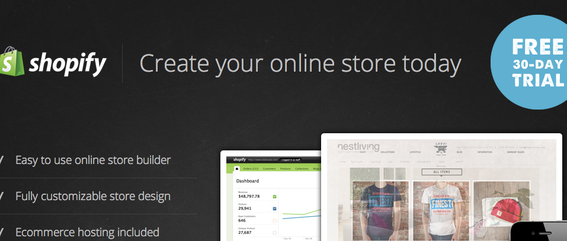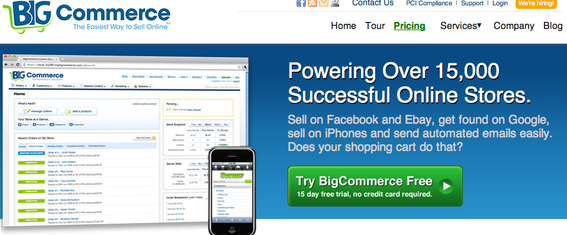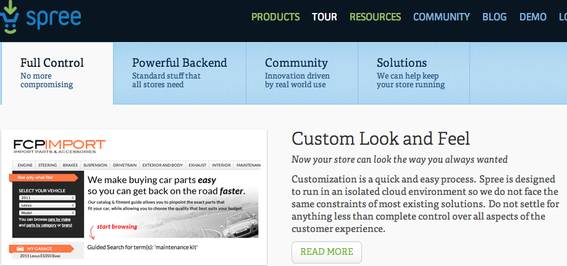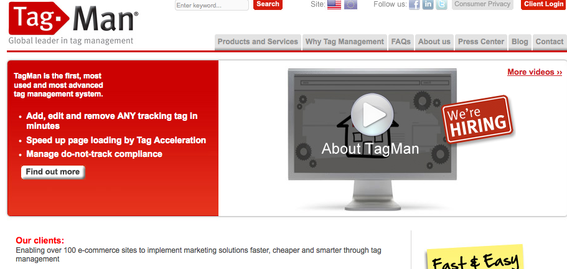While venture capital funding has generally been in the doldrums this year, a few ecommerce software companies — and even some online sellers — have managed to attract equity investors. Following are a few success stories.
Shopify

Shopify
Shopify, an Ottawa, Canada-based ecommerce platform provider, this month received a $15 million Series B investment from Bessemer Venture Partners, FirstMark Capital, Felicis Ventures, and Georgian Partners, building on a $7 million Series A investment received last year. Established in 2006, Shopify provides the platform for more than 15,000 online stores in 80 countries.
While other companies may prefer to have just one VC investor, Shopify is happy with four. “Each of our investors provides a unique skill set, background, and network,” asserts Harley Finkelstein, chief platform officer at Shopify. According to Finkelstein, the company had “lots of inbound interest from very prestigious investors. The toughest part was actually having to say no to some.”
The money will help Shopify pursue strategic partnerships and acquisitions and expand operations. With the announcement of the investment also comes the official launch of “The Shopify Fund.” This one million dollar pool will be used to provide advances to developers against future application sales. Finkelstein says, “We’re currently working with about 100 app developers, and offer more than 80 apps in the Shopify App Store. We’re really excited to start working with tons of new rock star developers. The idea behind our one million dollar fund is to further enrich the experience for Shopify’s more than 15,000 merchants by building our App Store ecosystem.”
BigCommerce

BigCommerce
After turning down venture capital for the past two years, BigCommerce, a provider of shopping cart software for small and mid-sized online sellers, raised $15 million in July of this year from General Catalyst Partners. Founded in 2003 in Sydney, Australia, BigCommerce established a U.S. presence in Austin, Texas in 2009.
Eddie Machaalani, founder and co-CEO, says it wasn’t hard to get the $15 million, a substantial sum in these economic times. “We had VCs pursuing us — at least ten — because in a downturn, VCs look to put money in a well-run business. We had bootstrapped the company, were profitable, and customers liked our product.”
Being in the enviable position of being able to choose among investors meant that BigCommerce could select between those “who are numbers crunchers and those who are entrepreneurial-driven”, says Machaalani. He adds that General Catalyst Partners is aligned with the entrepreneurial vision of BigCommerce and has ecommerce experience, which made the firm attractive to Machaalani and his co-founder Mitch Harper.
The company, which claims 20,000 customers, will use the Series A money to expand product development as well as hire new sales and marketing personnel, primarily at its offices in Austin, Texas but also in Sydney.
Spree Commerce

Spree Commerce
An open source, Ruby-on-Rails-based ecommerce software project that emerged into a full-fledged company earlier this month, Spree Commerce has recently received $1.5 million is seed funding from True Ventures, AOL Ventures and an angel investor.
While the ecommerce software platform was always free, paid consulting from Rails Dog, a services company that builds customized Spree websites, supported it. Sean Schofield was the CEO of Rails Dog and is now the CEO of Spree Commerce, located in Bethesda, Maryland.
How does a company with open-source software attract venture capital?
By bundling the software with paid services. Schofield says, “Our initial efforts will be focused on providing hosted solutions that include support. We’re currently offering packages that cater to developers. Pretty soon we’ll also have an inexpensive SaaS product for the non-technical audience.” Managed cloud hosting services from Rackspace — the large hosting company — are offered on the Spree Commerce website and Schofield characterizes that relationship with Rackspace as an “emerging partnership.”
“Long term we’re exploring several different partnerships and other interesting revenue opportunities. Of course the Spree software will remain 100 percent open source. We were very clear about that with our potential investors. Most VCs that we talked to seemed to be very accepting of open source,” adds Schofield.
“The harder part in getting funded was our location, since we are not located in one of the traditional hot spots. People kept asking us if we were planning on moving to the Valley. Our local VCs are not big on funding early stage companies so we just had to be persistent until we found a West Coast VC that invests outside of the Valley.”
Spree intends to use the money to hire a full-time community manager to help with documentation and training. It will also hire more people to work full-time on research and development and it is planning regional conferences to meet its users face to face. Additionally, Schofield says that Spree will build a more active developer network similar to what Magento has.
Rent the Runway

Rent the Runway
In May of this year, Rent the Runway, a New York-based company that rents designer clothes and accessories to women for special events at 90 percent off retail received a second round of VC funding.
Kleiner Perkins Caufield & Byers invested $15 million in the company. Rent the Runway previously received more than $16 million from Bain Capital Ventures and Highland Capital Partners. Started by two Harvard Business School friends in late 2009, the company already has one million active users and is profitable.
Rent the Runway makes extensive use of software. An algorithm helps women choose garments appropriate for their age and body type. New funds will be used to expand underlying technology, an inventory managements system, social network aspects of the business, and new physical distribution hubs.
TagMan

TagMan
This month, TagMan, a provider of advertising-tracking systems, received a second round of funding — $5 million — from Greycroft Partners and iNovia Capital. This latest round takes TagMan’s total funding past the $10 million mark and follows a $2.3 million Series A round in January. In a press release, Paul Cook, CEO and founder of TagMan, stated, “…we expect to open several new sales and support offices over the next year, in Europe and North America. In the near-term we’ll be launching initiatives to drive greater adoption of our tag management technology — both directly and through partners.”
Founded in 2007, the company now has over 100 ecommerce sites deploying its tag management system. The product allows advertisers to manage online marketing tags — pieces of code used by the online advertising industry to track the performance of online campaigns — as well as the data these tags provide. Each time a viewer goes to a page on a publisher’s website or clicks on a display on the page, one or more requests are sent from the publisher’s website to an advertiser/merchant’s website via an advertising network, or affiliate, or paid search link. TagMan is primarily concerned with tag management on advertiser sites.




